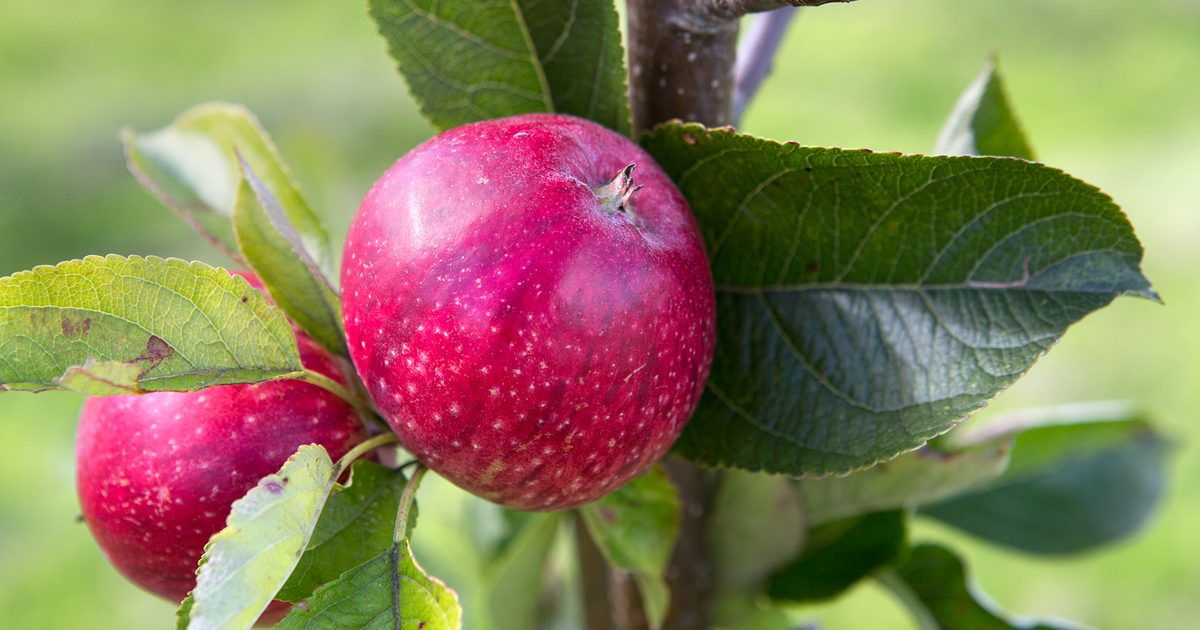[ad_1]
When selecting your apple tree, be aware of what Pollination Group the variability is in, in addition to the rootstock the variability is grown on. All apple timber profit from two or extra apple timber rising close by to supply a very good crop. These two additional varieties must be completely different to the unique and ought to be in the identical or adjoining pollination teams as the unique.
This mentioned, self-fertile apple varieties, ‘Granny Smith’ for instance, will nonetheless produce a crop with out different apple timber rising close by. So go for a self-fertile selection if you happen to solely have room for one.
To seek out out extra about completely different rootstocks, and the advantages of every, try our information to fruit tree rootstocks.
Extra on rising apples:
Try a few of the finest varieties to develop, beneath.

‘Granny Smith’
This revered consuming (or dessert) apple is liked for its agency, crisp texture, giving it a very good crunch when bitten into. ‘Granny Smith’ is in Pollination Group 3 – develop two or extra apple varieties from Group 2, 3 or 4 close by for profitable pollination. Self-fertile.
‘Braeburn’
‘Braeburn’ is an consuming apple with a candy flavour and rosy pink color. This self-fertile selection is present in Pollination Group 4 and could be pollinated by different apples in Teams 3, 4 and 5. Use this selection to make a scrumptious tarte tatin.
‘Falstaff’
‘Falstaff’ is a self-fertile consuming apple, recognized for being a heavy cropper with a very good, tangy crunch. Nice for juicing. Pollination Group 3. The carefully associated ‘Purple Falstaff’ has pores and skin that’s flushed pink when ripe.
‘Adam’s Pearmain’
‘Adam’s Pearmain’ is a standard English dessert selection with nutty flavour that’s extra savoury than others. This self-sterile selection is present in Pollination Group 2 – develop two or extra completely different varieties in Teams 1, 2 or 3 close by for profitable pollination.
‘Bramley’s Seedling’
‘Bramley’s Seedling’, also known as merely ‘Bramley’, is the traditional cooking apple. Identified for its sharp, acidic flavour, it makes a scrumptious puree and can be utilized in muffins and crumbles. The primary tree of this selection was grown from seed in 1809, and continues to be alive and productive. Self-sterile, Pollination Group 3.
‘Redlove Period’
‘Redlove Period’ is among the few apples to have pink flesh, with a flavour that’s each candy and tangy. Eat straight from the tree or attempt cooking with it – the pink flesh will preserve its color. Self-sterile – develop completely different varieties close by.
‘Cox’s Orange Pippin’
‘Cox’s Orange Pippin’ is taken into account by many, cooks included, to have the most effective flavour of any apple. A flexible apple that can be utilized in candy and savoury dishes, cider and juices. The draw back is that it has poor illness resistance and dislikes chilly, moist circumstances. Self-sterile, Pollination Group 3.
‘Blenheim Orange’
This consuming apple has a stunning spicy, russet flavour that is properly suited to cooking, notably in making tarts and purees. Self-sterile, ‘Blenheim Orange’ is present in Pollination Group 3.
‘Lord Lambourne’
‘Lord Lambourne’ is a traditional consuming apple with a candy, tangy flavour and crisp flesh. An awesome alternative for consuming contemporary or making juice. Nicely-suited to colder, wetter areas. Pollination Group 2.
‘Captain Kidd’
‘Captain Kidd’ is a self-sterile selection in Pollination Group 3. It is a good various to ‘Cox’s Orange Pippin’, being simpler to develop however remaining an fragrant, crunchy apple. Best for juicing and making tarts.
Apple varieties that retailer properly
- ‘Braeburn’
- ‘Granny Smith’
- ‘Gala’
- ‘Meridian’
- ‘Chivers Delight’
- ‘Cox’s Orange Pippin’
- ‘Adam’s Pearmain’
- ‘Bramley’s Seedling’
- ‘Egremont Russet’
- ‘Spartan’
[ad_2]